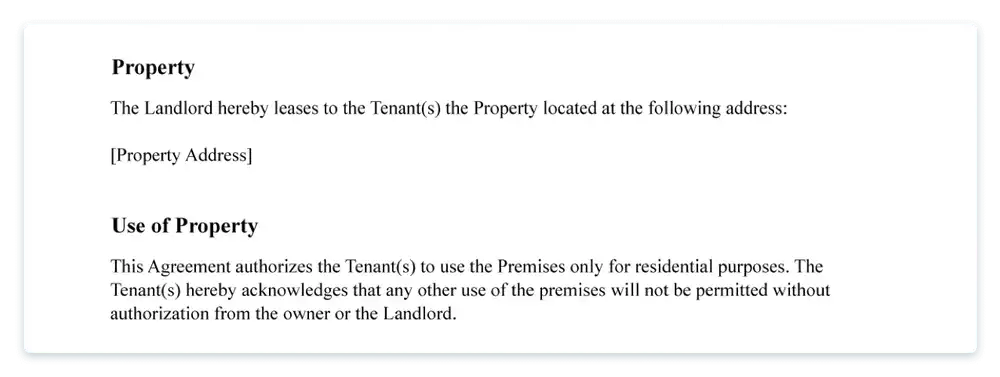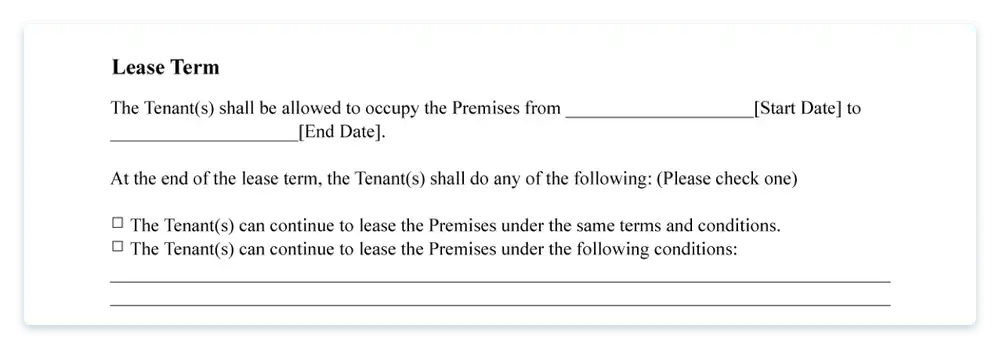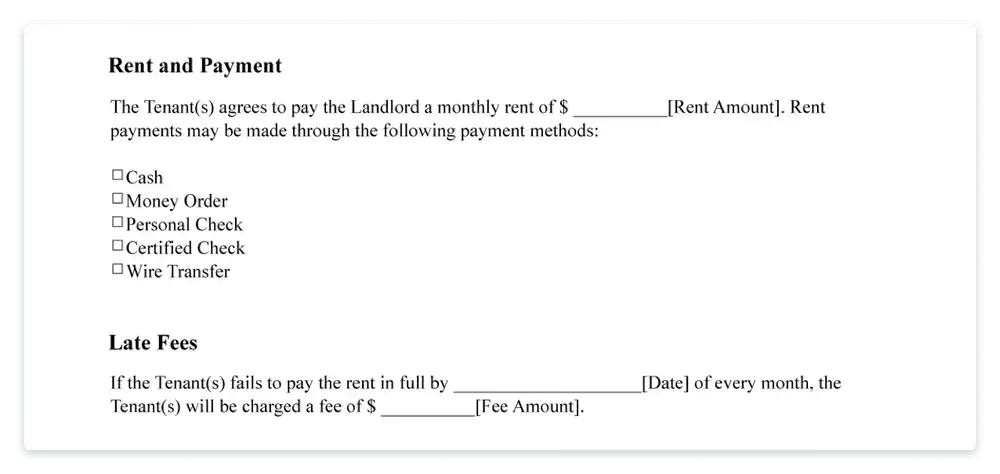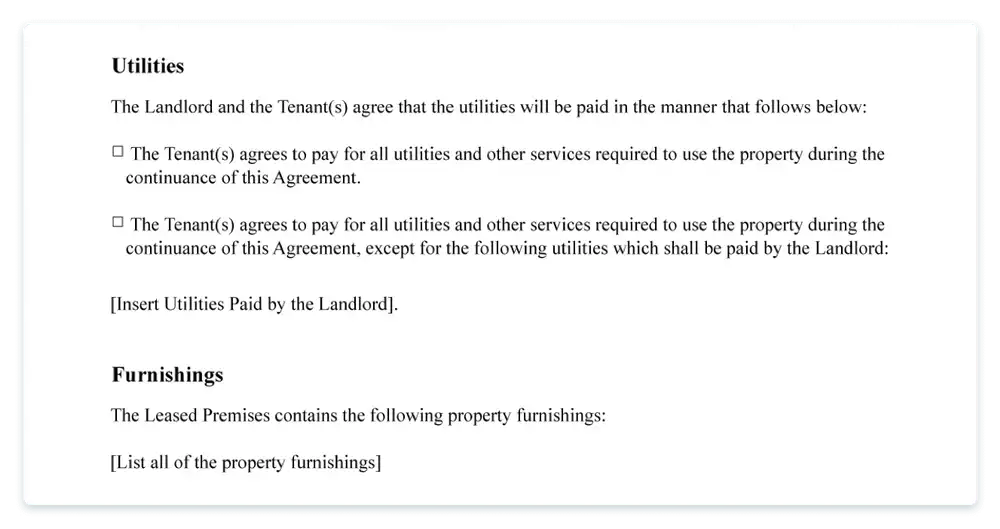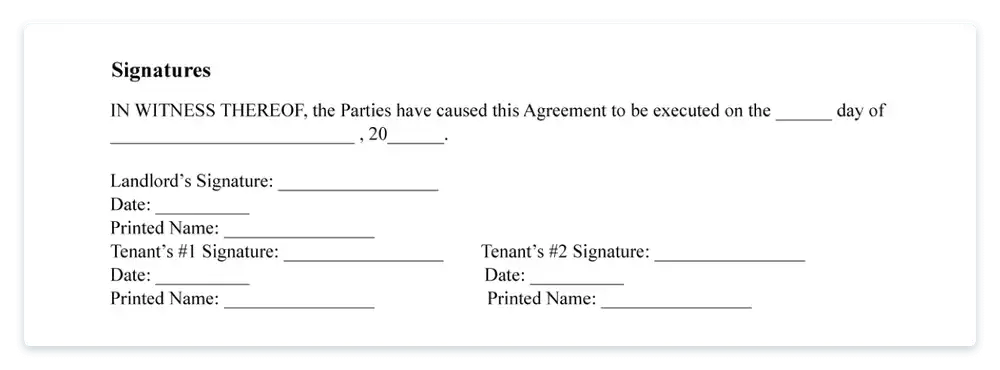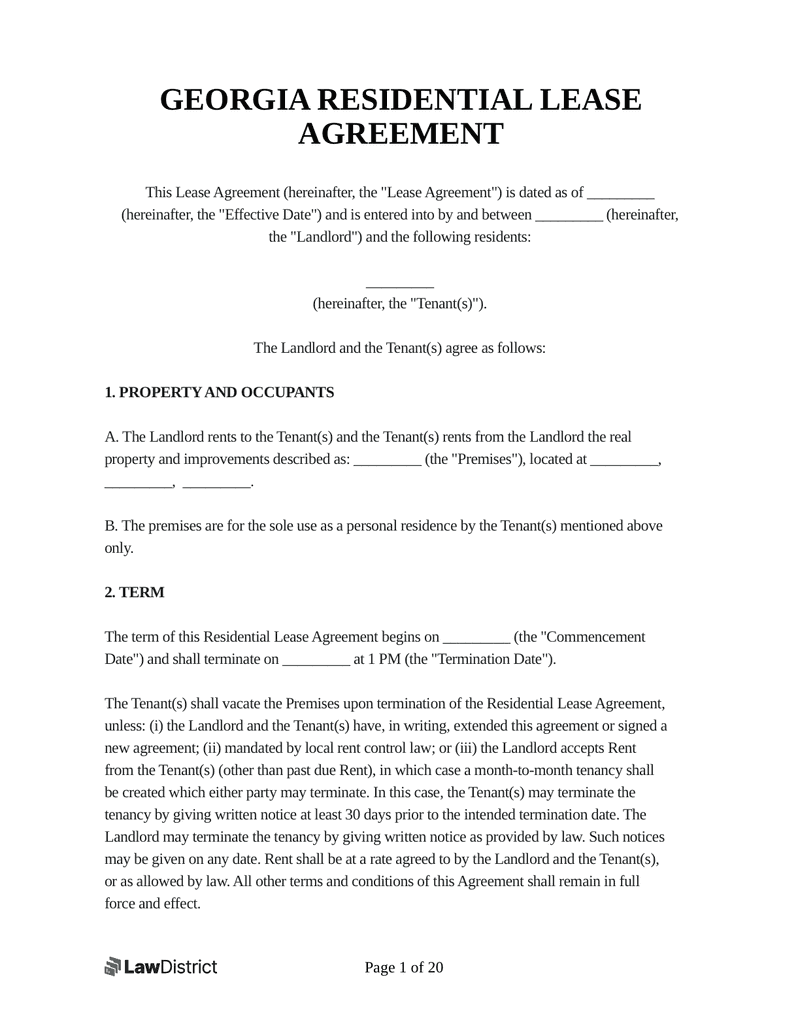GEORGIA
RESIDENTIAL LEASE AGREEMENT
This Lease Agreement (hereinafter, the "Lease Agreement") is dated as of _________ (hereinafter, the "Effective Date") and is entered into by and between _________ (hereinafter, the "Landlord") and the following tenants:
_________
(hereinafter, the "Tenant(s)").
The Landlord and the Tenant(s) agree as follows:
1. PROPERTY
a) The Landlord is the owner of certain real property and improvements described as a house, located at _________, _________, Georgia _________ (hereinafter, the "Property"). The Property is further described as follows: _________.
b) The Landlord rents to the Tenant(s) and the Tenant(s) rents from the Landlord the Property according to the terms and conditions described in this Lease Agreement.
c) Unless otherwise indicated in the Lease Agreement, no other portion of the building (hereinafter, the "Building") is included in the Lease.
2. OCCUPANTS
a) During the Term of this Lease Agreement, no more than _________ person(s) may reside on the Property unless the prior written consent of the Landlord is obtained.
b) The only individuals permitted to reside on the Property are the following:
_________
c) The Tenant(s) may not permit any guest to stay on the Property longer than _________ consecutive days or _________ days in a calendar year. The Tenant(s)'s guests will not be considered original occupants of the Property under any circumstances.
d) The amount of time the Tenant(s)'s guests may stay on the Property may never be longer than the time permitted by any owners' association rule or restrictive covenant or _________ consecutive days or _________ days in a calendar year, without Landlord's written permission, whichever is less.
3. TERM
The term of the Lease Agreement begins on _________ (hereinafter, the "Commencement Date"), and will terminate on _________ (hereinafter, the "Termination Date").
Upon the Termination Date, the Tenant(s) shall be required to vacate the Property unless one of the following circumstances occur:
a) The Landlord and the Tenant(s) formally extend this Lease Agreement in writing or create, execute and sign a new one.
b) Mandated by local rent control law.
c) The Landlord willingly accepts new Rent from the Tenant(s), which does not constitute past due Rent. In this case, a month-to-month tenancy shall be created, which the Tenant(s) may terminate by giving written notice at least 30 days prior to the intended termination date, and the Landlord may terminate by giving written notice at least 60 days prior to the intended termination date.
4. MANAGEMENT
The Tenant(s) is hereby notified that the Owner or Landlord _________ is the Property Manager in charge of repairs or maintenance of the Property.
If the Tenant(s) has any complaint regarding any issue about the Property, _________ shall be contacted by one of the following methods:
Address: _________
Telephone: _________
Email: _________
5. RENT
All monetary obligations of Tenant(s) to Landlord under the terms of this Lease Agreement, except the Security Deposit, are deemed to be rent (hereinafter, the "Rent").
a) Tenant(s) will pay to Landlord monthly Rent in the amount of $_________ for each full month during this lease. The full month's rent is due and payable not later than the first day of each calendar month, and is delinquent on the next day. If that day falls on a legal holiday, the rent is due on the next business day.
b) Method of Payment: The Tenant(s) shall pay Rent by selecting any of the following forms of payment:
6. NON-SUFFICIENT FUNDS
In the event that any payment by the Tenant(s) is not honored by the institution on which it was drawn or is returned for non-sufficient funds, or if the Tenant(s) stops payment, the Landlord shall charge a monetary fee of $_________ to the Tenant(s) for each such payment as reimbursement of the expenses incurred, plus late charges as described below (if any), until the Landlord has received payment.
Furthermore, the Landlord may require in writing that the Tenant(s) pay all future Rent payments by cash, money order, cashier's check, or any other type of certified fund.
The parties agree that three (3) returned checks in any twelve (12) month period constitutes a frequent return of checks due to insufficient funds and shall be considered a just cause for eviction.
7. UTILITIES AND SERVICES
The Landlord agrees to be responsible for the following utilities and services in connection with the Property:
The Tenant(s) agrees to be responsible for the following utilities and services in connection with the Property:
Water and sewer
Garbage and trash disposal
Gas
Electricity
Heating
Telephone services
Internet
Cable
8. PETS / STRAYS
No animal or pet shall be kept, permanently or temporarily, on or about the Property, even temporarily or with a visiting guest. As provided by law, a Service Animal(s) is not considered a pet, and every individual with a disability shall have a right to have a Service Animal(s) on the Property.
Any animal discovered on or around the property will be considered a stray. Strays shall not be kept or fed in or about the Property. All strays will be reported to the proper authorities and removed at the Tenant(s)'s expense.
9. SMOKING
Smoking is not allowed in or on any area of the Property, including individual units and common areas, both indoors and outdoors. This policy applies to all owners, tenants, or guests.
If the Tenant(s) contravenes this provision by smoking or allowing guests to smoke in any place on the property, then such Tenant(s) shall be held liable for any damages caused to the Property. The violation of this provision shall be considered a just cause for the eviction of the Tenant(s) by the Landlord.
This restriction includes the use of e-cigarettes and vaping.
10. MAINTENANCE
The Landlord will have the responsibility to maintain the Property in good condition at all times and perform all repairs reasonably necessary to meet the implied warranty of habitability of the Property, that is, that the Property is in a safe and livable condition.
11. REPAIRS
All requests for repairs must be in writing and delivered to the Landlord. Only in the event of an emergency related to the condition of the Property that materially affects the physical health or safety of an ordinary tenant, the Tenant(s) may call the Landlord.
The Tenant(s) may not repair or cause to be repaired any condition, regardless of the cause, without the Landlord's permission. All decisions regarding repairs, including the completion of any repair, whether to repair or replace an item, and the selection of contractors, will be at the Landlord's sole discretion.
If, in an emergency, it shall become necessary to make any repairs or replacements by the Tenant(s) without prior written consent from the Landlord, at Landlord's expenses, and such repairs or replacements are found to be unsatisfactory and to have caused additional damages, the Tenant(s) shall reimburse Landlord for the cost of making such repairs.
12. RENTER'S INSURANCE POLICY
a) During the term of this Lease Agreement and any extension thereof, the Tenant(s) will acquire and maintain, at its sole cost and expense, a Renters' Insurance Policy by a company or companies reasonably satisfactory to the Landlord.
b) The Tenant(s) shall name the Landlord as an additional insured under such policy.
c) The amount of such insurance shall be not less than $_________.
d) The Tenant(s) shall deliver appropriate evidence to the Landlord as proof that adequate insurance is in force. The Landlord shall receive advanced written notice from the insurer prior to any termination of such insurance policies.
The Tenant(s) may be required by the Landlord to maintain any other kind of insurance which the Landlord may deem reasonable for the protection of the Landlord's interest in the Property.
13. PROPERTY INSURANCE
The Landlord and the Tenant(s) agree to be responsible for maintaining property insurance or any other kind of insurance to protect their respective interests in the Property and all of their respective possessions and belongings located in and on the Property.
14. ALTERATIONS AND IMPROVEMENTS
The Tenant(s) shall not make any alterations, additions, redecorations, or any sort of improvements on the leased Property without the Landlord's prior written consent. All additions, alterations, fixtures, or improvements made by the Tenant(s), except movable household furniture, shall become the Landlord's property and remain on the Property as part of the Property and shall be surrendered with the leased premises at the Termination of this Lease Agreement.
15. HAZARDOUS MATERIALS
The Tenant(s) shall not keep or have on the Property any article or item of a dangerous, flammable, or explosive material that might unreasonably increase the danger of fire or explosion on the Property or that might be considered hazardous or extra hazardous by any responsible insurance company.
16. LANDLORD ACCESS TO PROPERTY
The Landlord and the Landlord's agents shall have the right at all reasonable times, and by all reasonable means during the term of this Lease Agreement and any renewal thereof, to enter the Property for the following purposes:
(i) Survey the Property's condition and take photographs to document the condition.
(ii) Make repairs or improvements to the Property.
(iii) Supply agreed services.
(iv) Show the Property to prospective buyers or tenants.
(v) Exercise a contractual or statutory lien.
(vi) Leave a written notice.
(vii) Seize nonexempt property if the Tenant(s) is in default.
Except in case of emergency, the Landlord will give the Tenant(s) reasonable notice of intent to enter. For these purposes, twenty-four (24) hour written notice will be deemed reasonable.
17. ASSIGNMENT / SUBLETTING
The Tenant(s) acknowledges that this Lease Agreement is not transferable and that the Tenant(s) may not assign or sublet this Lease Agreement, grant any license to use the Property or any interest in the Property or any part thereof, nor mortgage or pledge this Lease Agreement.
The Tenant(s) shall not contravene this provision, unless the Landlord expressly waivers this prohibition in writing, the consent of which the Landlord may, in any case, withhold in its sole and absolute discretion.
18. NOTICES
Notice under this Lease Agreement will be given in accordance with the applicable statute. All other notices shall be deemed sufficient if made as follows:
1) All notices to the Landlord shall be directed by personal delivery or first-class mail to the Landlord at the appropriate address set forth below, until the Tenant(s) is notified, in writing, to the contrary.
2) All notices to the Tenant(s) shall be directed by personal delivery or first-class mail to the Tenant(s) at the Leased Property or any forwarding address provided in writing by the Tenant(s) to the Landlord.
LANDLORD:
_________
_________
TENANT:
_________
_________
_________, Georgia _________
Such addresses may be changed from time to time by any party by providing notice as set forth above.
19. ADDITIONAL PROVISIONS; DISCLOSURES
20. VENUE AND GOVERNING LAW
The exclusive venue is in the county where the Property is located. This Lease Agreement shall be governed, construed, and interpreted by the Laws of the State of Georgia.
IN WITNESS WHEREOF, the Landlord and the Tenant(s) have executed this Lease Agreement in the manner prescribed by law as of the Effective Date.
LANDLORD:
By: ____________________________ Date: ______________
_________
TENANT:
By: ____________________________ Date: ______________
_________
GEORGIA LEASE AGREEMENT
INSPECTION CHECKLIST
The Tenant(s) has inspected the Property and states that the Property is in satisfactory condition, free of defects, except as noted below:
| SATISFACTORY | COMMENTS |
| Bathrooms | _________ | _________________________ |
| Carpeting | _________ | _________________________ |
| Ceilings | _________ | _________________________ |
| Closets | _________ | _________________________ |
| Countertops | _________ | _________________________ |
| Dishwasher | _________ | _________________________ |
| Disposal | _________ | _________________________ |
| Doors | _________ | _________________________ |
| Fireplace | _________ | _________________________ |
| Lights | _________ | _________________________ |
| Locks | _________ | _________________________ |
| Refrigerator | _________ | _________________________ |
| Screens | _________ | _________________________ |
| Stove | _________ | _________________________ |
| Walls | _________ | _________________________ |
| Windows | _________ | _________________________ |
| Window coverings | _________ | _________________________ |
| _________ | _________ | _________________________ |
| _________ | _________ | _________________________ |
_____________________
Date
TENANT:
By: ____________________________ Date: ______________
_________
Acknowledged by Landlord:
By: ____________________________ Date: ______________
_________

